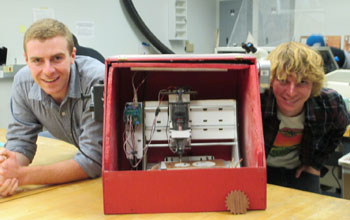Campus News
Carving out their niche
Alumni business partners find Kickstarter enthusiasm for their creation — a programmable desktop 3-D router with a consumer-friendly a price tag.

UC Santa Cruz student Bar Smith just wanted to solve a problem: How could an electrical engineering major like him turn ideas into prototypes when the equipment he needed to do so was out of financial reach?
Two years later, the shaggy-haired College Ten graduate and his business partner, Tom Beckett (Kresge ’13, history, minor technology and information management), not only came up with a solution but now find themselves entrepreneurs. After a successful Kickstarter campaign netted them more than $80,000, the two are marketing a programmable desktop 3-D router that carries a price tag within reach of the masses.
Instead of a machine that costs many hundreds or even thousands of dollars, theirs sells for $200.
“It lets people compete in a world of really complex things,” said Beckett.
A tool like Smith and Beckett’s, dubbed a CNC (Computer Numerical Control) router is the opposite of a 3-D printer. While a 3-D printer is an additive technology — it builds something from the ground up — a router is subtractive. It allows a user to carve a shape out of a variety of materials from wood to circuit board to polystyrene foam and even brick.
Smith, now 23, knew how important a CNC router could be for anyone with an idea for a new product. He had access to a graduate-student lab in the Baskin Engineering building that held a laser cutter and a board router, which cost a total of $150,000. But most undergraduate students didn’t have the same opportunity because of liability and training issues.
“You could spend eight straight hours wiring up something that these machine could have done in minutes,” Smith said. “That was exactly the problem I was trying to solve.”
He began tinkering.
Smith played with different motors and sensors. He assembled designs out of used pizza boxes. He learned how to program software. After awhile, the sound of drills and small motors began to seep from his room into the rundown apartment he shared with Beckett.
Months later, when Smith finally emerged with a precise but inexpensive router — and the software needed to run it — Beckett, who’d always wanted to be an entrepreneur, saw the potential. Over a load of wash at a local laundromat, the two formed a partnership. They named their company Makesmith, after the burgeoning Maker movement, a technology culture patterned on the Do-It-Yourself ethos.
With the help of other UCSC grads and students, the two created a website and videos, then launched a Kickstarter campaign. They reached their $10,000 goal in eight hours, and by the time the funding window closed a month later they had 423 backers from 47 countries and $82,207 in pledges.
“It was kind of like a dream,” Beckett said.
Beckett and Smith are now gearing up to begin manufacturing and shipping their router kits but, in true UC Santa Cruz style, they’ve also made their hardware open-source so a customer could either order a Makesmith router kit or download Smith’s schematics and build their own machine from scratch.
“Smith and Beckett’s router puts making back into the hands of the everyday consumer,” said UC Santa Cruz Professor Jennifer Parker, founding director of the campus’s multi-disciplinary OpenLab Research Center. “For example, instead of going out and buying a plastic bin to put stuff in, maybe you would cut one out of wood if you had a CNC router, or maybe you’d be more inspired to make your own gifts for people instead of buying them. It’s like desk-top publishing only with stuff instead of books.”
The router enables people to fix or build their own products in new and exciting ways, perhaps even to live a more sustainable lifestyle by not adding to consumer waste each time something breaks and needs to be replaced, according to Parker. It also fosters consumer creativity. Ideas of “what should I buy” might be more like “what can I make?” Parker said. Some people also are more likely to move from design to production of an idea with a tool like this.
“It’s the next generation of home tools that enables someone to move from the digital realm of designing out to the analog and even back to digital when needed,” Parker said. “It’s the kind of fluidity that is happening more and more.”
Recently, the Makesmith router won second place and a $3,000 check in UCSC’s Entrepreneurship Showcase.
The pair’s Kickstarter money will allow them to not only manufacture and refine their router but also move on to other projects.
“We live in an exciting era where things are changing quickly and a lot of things can be improved. There’s a lot of low-hanging fruit,” said Smith and grinned. “All the cool things haven’t been discovered yet.”